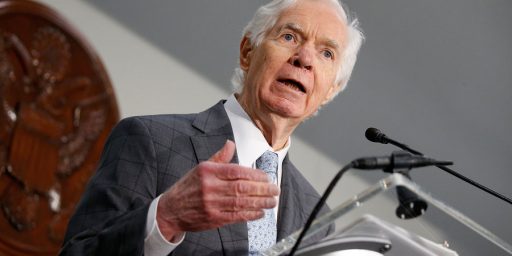Thad Cochran, Longtime Congressman And Senator, Dead At 81
Thad Cochran, who represented Mississippi in Congress for 45 years, has died at the age of 81.

Thad Cochran, who served as a Senator and Congressman from Mississippi for 45 years, has passed away at the age of 81:
Thad Cochran, a courtly Mississippi Republican who cultivated his constituents for 45 years as a congressman and United States senator with traditional catfish fries, Southern charm and billions of dollars in federal pork-barrel largess, died on Thursday in Oxford, Miss. He was 81.
His death was confirmed by the office of Senator Cindy Hyde-Smith, who replaced him in the Senate after he resigned in 2018 because of health issues. The cause was not specified.With his homespun politics, moderation on racial issues and business-oriented conservatism, Mr. Cochran may have seemed out of place on the modern Washington merry-go-round. But he outlasted almost everyone, winning three terms in the House of Representatives and seven in the Senate.
With more than two years remaining in his last term, Mr. Cochran resigned on April 1, 2018. His 45-year tenure was the longest of any currently serving member of Congress. His 39 years in the Senate was the 10th-longest stretch in history, and he was that body’s third longest-serving incumbent, behind only Patrick Leahy of Vermont and Orrin G. Hatch of Utah.
Mr. Cochran never lost a general election. He narrowly won his first House race, but was easily re-elected twice. In most of his Senate races he won easily; he was unopposed twice and did not face a serious challenger for decades until 2014, when he was beaten in a primary that was so close it required a runoff. He won the runoff and the general election for his seventh term.
Mr. Cochran derived most of his power from 37 years on the Senate Appropriations Committee, which has jurisdiction over all discretionary government spending, and from several terms as its chairman. Those perches gave him enormous authority to allocate funds and to bring home special projects for his state, often called pork-barrel spending.
He occasionally made national headlines. After Donald J. Trump became president in 2017, Mr. Cochran recommended a military spending appropriation of $581 billion for fiscal 2018 — $15 billion more than Mr. Trump’s request — and $65 billion for overseas contingency operations.
He also urged action to avert government shutdowns and to provide relief for regions hit by hurricanes and wildfires.
But the appropriations that made news back home were those that counted with the electorate — money that, through his influence, went to Mississippi’s Gulf Coast ports, universities, public schools, agriculture, airports, highways, bridges, health centers, fire and police departments, and more, including catfish research.
In Mr. Cochran’s rarefied world of discretionary spending, billions moved like nickels. It is hard to estimate the vast sums he helped funnel into his state over decades. His Senate biography notes that in 2005 he “spearheaded the effort to provide more than $87 billion in supplemental assistance to Mississippi and Gulf Coast states devastated by Hurricane Katrina.”
A Mississippi watchdog group, Citizens Against Government Waste, called Mr. Cochran the “King of Earmarks” in 2010, saying he had pushed $490 billion in pork-barrel projects, the most in the nation. In public finance, earmarks are items in an appropriations bill that direct funds to a specific recipient, circumventing competitive, merit-based allocation processes.
While back home Senator Cochran was known for the catfish fries he held for voters, in Washington he was a catfish-farm booster. Mississippi leads the nation in catfish production, and the bills he sponsored protected the industry from Asian rivals. Mississippi State University’s Thad Cochran National Warmwater Aquaculture Center(for research) is one of many public works bearing his name.
“The longer I’ve been there, the more I appreciate the seniority system,” Mr. Cochran said at a rally in Jackson, the capital, during his last hurrah in 2014. “It has benefited our state in a lot of ways.”
A son of the nation’s poorest state, Mr. Cochran was a young lawyer in Jackson when he made his first foray into Republican politics, heading Richard M. Nixon’s 1968 Mississippi campaign for president.
It was a modest beginning. Mr. Cochran’s elections were significant events in the South’s historic 20th century political realignment. He and Trent Lott, his high-profile Mississippi colleague in the House and Senate, both entered Congress in 1972 in an early wave of Republicans taking seats in Southern states that had long been Democratic.
Six years later, Mr. Cochran succeeded Senator James O. Eastland, a Democrat and an ardent segregationist, who was retiring. He became the first Mississippi Republican elected to the Senate in a century.
Mr. Cochran was a moderate on racial issues. But the Southern swing to Republicans did not imply more than cosmetic changes in conservatives’ political outlook.
(…)
William Thad Cochran was born on Dec. 7, 1937, in Pontotoc, Miss., the older of two sons of William Cochran, a school principal in Beckham, and Emma (Berry) Cochran, a teacher. The family, which included another son, Nielson, settled in 1946 in Byram, near Jackson, where Thad attended high school. He was an Eagle Scout; played football, basketball, baseball and tennis; and was class valedictorian in 1955.
At the University of Mississippi, he majored in psychology and minored in political science, was vice president of the student government, joined the Navy R.O.T.C. and graduated with honors in 1959. He later served 18 months aboard a heavy cruiser.
He studied law on a fellowship for a year at Trinity College, Dublin, and earned his law degree at the University of Mississippi in 1965. He joined a prestigious law firm in Jackson, soon became a partner and was active in civic, cultural and political groups — and destined for bigger things in Washington.
While he was, generally speaking, easily re-elected each time he ran, Cochran made national headlines in his final race in 2014. In that race, he came in second behind Mississippi State Senator Chris McDaniel, a candidate backed by Tea Party groups who also expressed views that are strikingly similar to those of what has since become the Trumpian Republican Party, but managed to beat him in a runoff Election and easily win re-election that November. In no small part, Cochran won that runoff thanks to his ability to get support from the state’s African-American voters, a sign of the moderation on racial issues that marked much of his career and differentiated him from other Mississippi Republicans.
Cochran’s victory may well have been a pyrrhic one, though. By late December 2017 health issues and what many observers called a noticeable mental and physical decline, leading to speculation that he may retire early. That became a fact when he announced in March 2018 that he was retiring. Shortly thereafter, Mississippi’s Governor named Agriculture and Commerce Commissioner Cindy Hyde-Smith to replace him. Hyde-Smith easily won the election on her own last November and will face an election for a new term in 2020.





Trump used the occasion of Cochran’s death to take another swipe at John McCain, noting that Cochran had traveled to D.C. to vote for the health care bill.
What I recall of Chris McDaniel, which is nothing good, is that he had some pussy-grabbing issues similar to Trump’s, although McDaniel’s utterances involved large breasts.
Read an article about him a few years ago. I guess his name is plastered all over the state as a result of his ability to funnel blue state money into his home turf. Thad Cochran-this and Thad Cochran-that. You’re welcome, Mississippi.